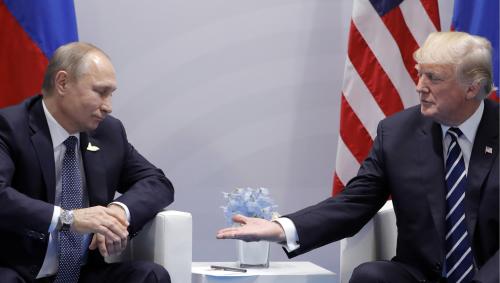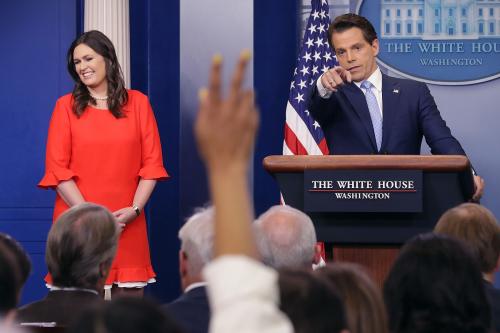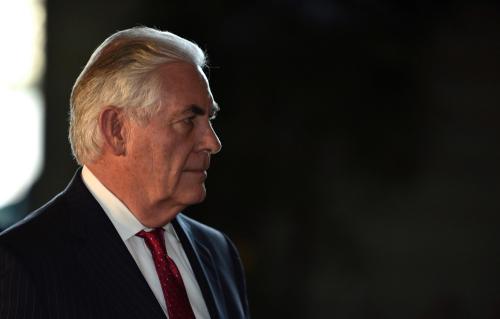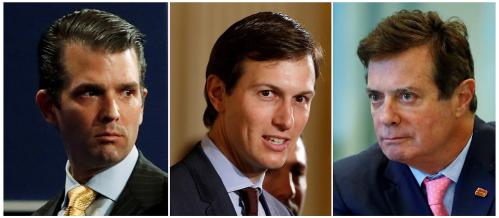The Trump administration’s approach to sanctions on Russia remains unclear after inconsistent statements from the White House press secretary and communications director on Sunday.
Abipartisan dealwas reached in Congress on Saturday on legislation allowing new sanctions against Russia for alleged interference in the US presidential election and military action in eastern Ukraine.

Russian President Vladimir Putin and US President Donald Trump at the G20 Summit in Hamburg on July 7, 2017. /VCG Photo
The Trump administration is reported to have lobbied against the bill, arguing that placing fresh sanctions on Russia hampers the president’s negotiating power.
The president is now in a tricky situation: veto the bill, risk looking weak on Russia, and leave himself open to a congressional override; or sign legislation that restricts his powers, which he has previously opposed.
What’s in the bill?
TheUS imposed a series of sanctionson Russia under the Obama administration, hitting both individuals and companies after Russia’s annexation of Crimea. Obama also expelled 35 diplomats and closed Russian diplomatic compounds in Maryland and New York after allegations of Russian interference in the 2016 election came to light.
Under the new legislation, Trump’s ability to end or loosen sanctions would be severely limited. He would be required to tell Congress of any moves that "significantly alter" US policy toward Russia. Congress would then debate the proposed changes and vote on whether to support them.
The legislation also opens the door to fresh sanctions against Iran and the DPRK, moves the White House is more amenable to. The DPRK had been left out of a sanctions bill passed by the Senate in June, but its inclusion is thought to have helped get the bill to the House floor.
Mixed messages
The newly-installed White House communications team -- Communications Director Anthony Scaramucci and Press Secretary Sarah Huckabee Sanders -- appeared on Sunday morning’s weekly political talk shows without a consistent line on Russian sanctions.
"We support where the legislation is now and will continue working with the House and Senate to put those tough sanctions in place on Russia until the situation in Ukraine is fully resolved and it certainly isn't right now," Huckabee Sanders told ABC News.

Sarah Huckabee Sanders and Anthony Scaramucci at the daily White House press briefing on July 21, 2017. /VCG Photo
With the House scheduled to vote on the bill on Tuesday, Huckabee Sanders seemed to leave the door open to opposition if the legislation is changed.
Her new boss, Scaramucci, offered a clearer answer, telling CNN that Trump “hasn't made the decision yet to sign that bill one way or the other.”
Trump does have the power to veto bills, although there is a strong chance that doing so in this case -- despite substantial backing from lawmakers -- would be overridden by Congress.
Why is Trump uncertain on sanctions?
The Trump administration has previously opposed strengthening sanctions on Russia, arguing that to do so would limit the president’s ability to negotiate with Russian President Vladimir Putin.
Secretary of State Rex Tillerson said in June: "I would urge Congress to ensure any legislation allows the president to have the flexibility to adjust sanctions to meet the needs of what is always an evolving diplomatic situation."

US Secretary of State Rex Tillerson has urged Congress not to bind the administration's hands on Russia. /VCG Photo
Trump has repeatedly said that the US should aim for a warmer relationship with Russia, something that is complicated by the sanctions imposed by the Obama administration.
The Senate in June voted 97-2 to pass the legislation, a rare instance of cross-party agreement in the chamber and clear opposition to the administration’s line. However, the legislation had until Saturday been held up in the House.
On Sunday afternoon, Trump complained about a lack of congressional support: "It's very sad that Republicans, even some that were carried over the line on my back, do very little to protect their President.”
Trump has also repeatedly questioned the legitimacy of allegations that Russia interfered in the 2016 election. Even on Sunday, Scaramucci relayed a recent conversation with Trump about Russia’s alleged election interference. "He basically said to me, 'Hey you know, this is, maybe they did it, maybe they didn't do it’,” he told CNN.
Challenging week ahead
The White House is braced for another tough week, with the “Russia factor” again likely to dog the administration. The House is expected to pass the sanctions bill on Tuesday, and leading figures from the Trump campaign are set to appear before Senate committees investigating Russian influence on the presidential election.

Donald Trump Jr., Jared Kushner, and Paul Manafort. /VCG Photo
Donald Trump Jr. and former Trump campaign chairman Paul Manafort will speak to the Senate judiciary committee on Wednesday as part of its investigation into alleged Russian interference.
Jared Kushner, Trump’s son-in-law and adviser, will be interviewed by representatives of the Senate intelligence committee on Monday and the House intelligence committee on Tuesday.